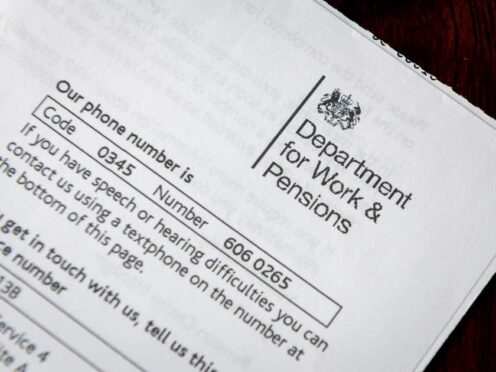
Parkinson’s sufferers are struggling to afford the basics as they face a benefits system that is failing them due to not enough understanding of the condition, a charity has said.
Parkinson’s UK said many of those it deals with are “poorer than they should be” and accused the Government of not fulfilling a promise to protect the most vulnerable amid the cost-of-living crisis.
The charity’s latest report is backed by former BBC presenter Mark Mardell, who has spoken about living with Parkinson’s.
He branded it “shameful that due to the broken benefits system, people with Parkinson’s who are eligible for support are being denied the help they so badly need” and said he was “pleased to add my voice to Parkinson’s UK’s calls for change”.
The charity’s research suggested almost a quarter (24%) of the 3,016 respondents to its latest survey in autumn said they were struggling to cover costs, which it said was higher than the 20% of the general population who said they were struggling in a YouGov survey last June.
Almost 40% of people with Parkinson’s who described themselves as struggling said that they did not have enough money to cover basic needs such as food, the charity’s latest report stated.
It said its analysis of Government statistics had found that people with Parkinson’s are, on average, 10% more likely to be inaccurately assessed for a personal independence payment (PIP) than other claimants.
The report said: “In 2023, our specialist benefit advisers took 60 of the most challenging PIP cases to appeal and secured £346,410 of previously unawarded entitlement for those clients.
“And this is just the tip of the iceberg. Across the country, day in and day out, our generalist advisers are also supporting people with their mandatory reconsiderations of PIP.
“Almost all of the refused or under-awarded PIP claimants we support through our expert advisers succeed in having the refusal overturned or their award increased.”
Research done by the charity in 2021 suggested that half of those it spoke to, who had experience of benefits and employment support, said the person assessing how Parkinson’s affects their daily living did not have a good knowledge of the condition.
The latest report has called on the Government to scrap the rule around symptoms having to affect someone with a long-term condition for 50% of the time if they are to be taken into account for PIP.
The charity said the “nature and degree of fluctuation of Parkinson’s symptoms mean that it is impossible
to predict when, for how long, and how severely they may manifest, and so whether or not the 50% threshold will be met or exceeded”.
The charity said it had seen a “steep rise” in inquiries from people living with the condition accessing our information about benefits, with more than a fifth of inquiries to its helpline last year being about benefits and maximising income.
It reported a 59% increase between 2021 and last year in people accessing online money, grants and benefits information pages, and a doubling of people ordering printed information packs.
Sue Christoforou, policy manager at Parkinson’s UK, said: “It’s appalling that due to a lack of support from the Government, people with Parkinson’s eligible for the benefits designed to support them, are poorer than they should be.
“Cutting back on basic essentials is hugely damaging to their physical and mental health.
“In January 2023, the Government promised to protect the most vulnerable. But a full year on, it still hasn’t. The cost-of-living crisis is not over.
“Avoidable poverty is having a profoundly negative impact on people living with Parkinson’s and we are calling on the UK Government to take urgent action to prevent further damage.”
It is understood there are no current plans in Government to remove the 50% rule.
A spokesperson for the Department of Work and Pensions (DWP) said: “We support millions of people with disabilities every year and our priority is that they receive a supportive, compassionate service.
“In the vast majority of cases we make the right decision, with just 3% of 2.9 million cases overturned at tribunal.
“All our disability assessors are qualified health professionals who have access to condition-specific information on Parkinson’s disease which has been quality assured by relevant external experts.
“And we are investing in their skills so that everyone has a positive experience when claiming PIP.”

Enjoy the convenience of having The Sunday Post delivered as a digital ePaper straight to your smartphone, tablet or computer.
Subscribe for only £5.49 a month and enjoy all the benefits of the printed paper as a digital replica.
Subscribe